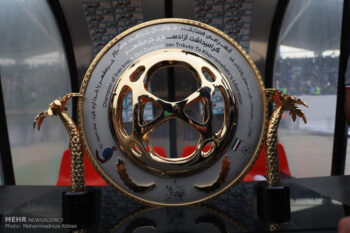Iran good, but their raucous fans even better

theage.com.au – MELBOURNE, If the relentless cheering a full hour before kick-off was not a sign that Iran were to benefit from a level of support typically associated with the home team, then the huge cheer in the second minute when a defender’s clearing kick saved a corner and instead provided a throw-in surely was.
The last time Team Melli played in Melbourne, in 1997, they were clearly outnumbered in terms of support among the 85,513 at the MCG for a World Cup qualifier, but they departed victorious. Their share of support among the impressive crowd of 17,712 at Sunday night’s match at AAMI Park was arguably even more pronounced than the Socceroos’ over them, with no discernible presence by a pro-Bahrain contingent.
Both the concourse and eventually the stands were awash with the white strips favoured by the Iranians, with many daubed with white, red and green body paint to ensure there was no doubt as to where their loyalties lay. One particularly patriotic supporter took up a post outside the city-end entrance and handed out mini Iran flags, probably at least a hundred, at no cost to anyone who sought one.
Iran are, at 51, the highest ranked team in FIFA’s world rankings taking part in the Asian Cup, which they qualified for with five wins and a draw from their six matches. Even though they only took one point from their three matches at last year’s World Cup in Brazil, including a 0-1 loss to finalists Argentina, they were not disgraced.
They were the early pacesetters since the Asian Cup was born in 1956, winning three of the first six titles. But since their last title, in 1976, they have not even reached the final in nine attempts, with Australia being the tenth attempt.
The Iranians had the ball twice in the net within the opening 31 minutes, but both were disallowed for offside by Australian referee Ben Williams. Iran’s inability to score did not generate resentment among their fans; they instead committed to cheer louder as a means of motivation.
Vorya Ghafouri provided a great cross from deep on the right, but Reza Ghoocahannejhad lacked both the height and spring to make contact with his attempted header. Jalal Hosseini later made contact with a header, which Ghoocahannejhad was unable to do, but his execution was awful as the ball sailed way off target.
The prospect of Iran going to the break still locked at nil-all disappeared – but only just in time. The corner from former English Premier League midfielder Andranik Teymourian was punched away from the mouth of goal by goalkeeper Sayed Abbas. His teammates’ lack of urgency in tracking the ball was punished when man of the match Ehsan Haji Safi, in the first minute of injury time, trapped the ball with his left foot and then crisply delivered a drive with his right that looped over Abbas into his net.
Iran’s goal allowed their supporters to be more subdued in the second half – but only by their own first-half standards.
The possibility of any lingering frustration from a third disallowed goal, in the 63rd minute, ended eight minutes later when Masoud Shojaei’s hooked volley from a corner was good enough to evade Abbas, who desperately scrambled in vain to his right to attempt to stop a shot that relied more on accuracy than power.
When the whistle was blown by Williams to mark Iran’s 2:0 victory, their players warmly acknowledged all sections of the AAMI Park crowd. But how could they not? The noise they generated in the stands was at least as memorable as anything the players did on the pitch.





 (28 votes, average: 4.93 out of 5)
(28 votes, average: 4.93 out of 5)

